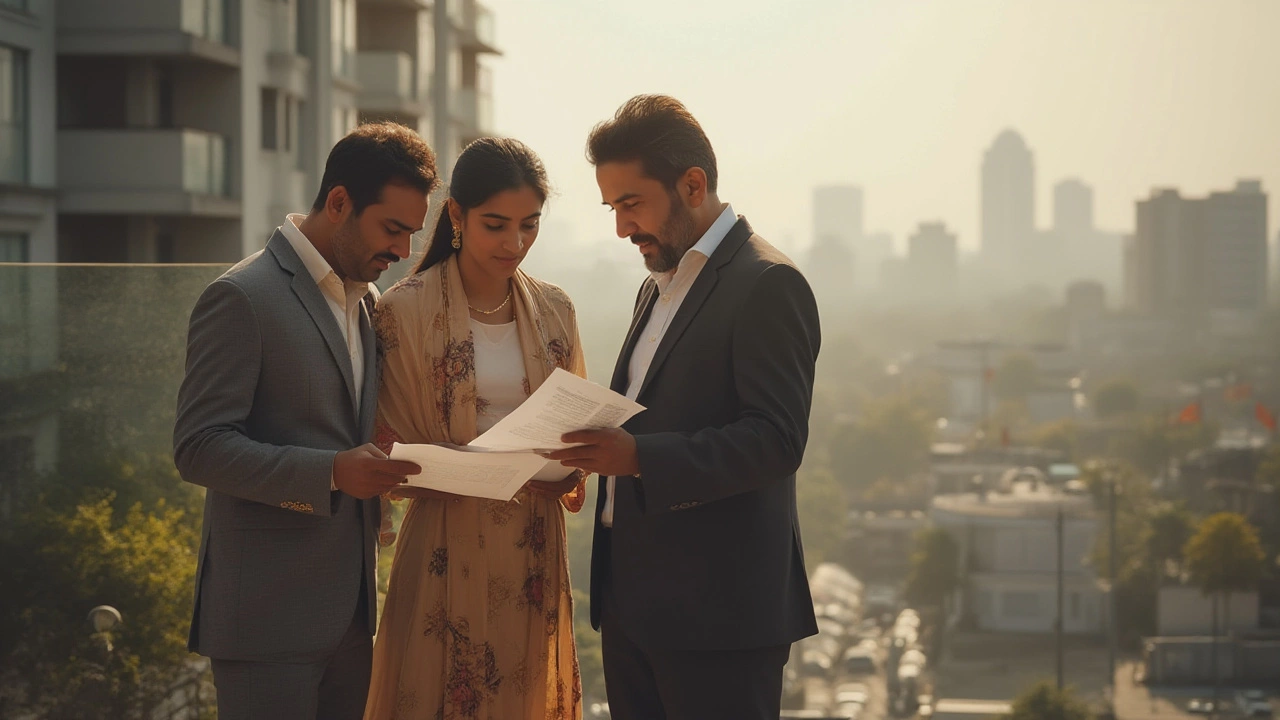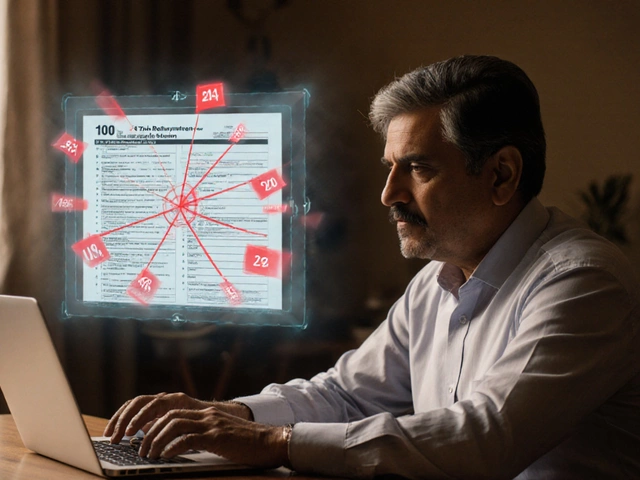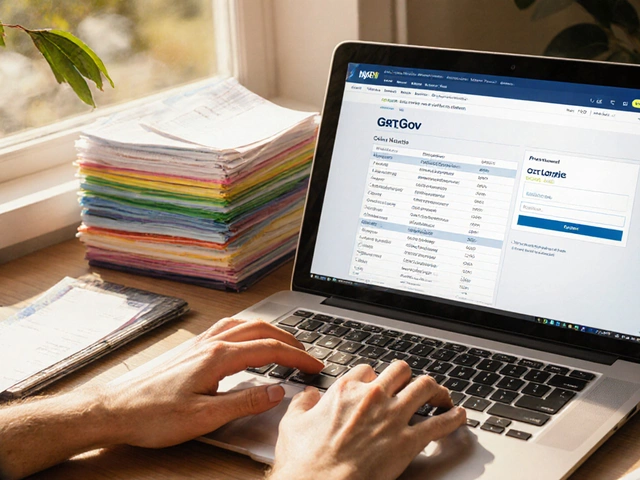
Ever wondered what happens when an Indian living abroad buys a house in Mumbai or inherits land in their hometown? It’s not just a question of staying connected—it comes with its own paperwork, and the taxman back home is still watching. Yes, even when you’re an NRI (Non-Resident Indian), property tax in India does not magically disappear. There’s a misconception that being out of the country shields you from local taxes, but try skipping payment and you’ll see the reality faster than you expect. Razor-sharp focus from urban local bodies, better tech, and digital payment systems have made it hard for anyone—NRI or not—to ignore their dues. Let's unpack what it really means for you as an NRI when it comes to property tax in India.
How Property Tax Works for NRIs in India
First off, property tax is probably the most overlooked bill on an NRI’s calendar. Maybe you paid for your Mumbai flat a decade ago or inherited your grandfather’s bungalow in Chennai. Whichever route, property tax is tied to the property—not its owner's passport location. It doesn’t matter if you pay income tax in London or study in California. The local municipal corporation where your property stands—the BMC in Mumbai or the BBMP in Bengaluru, for example—demands its annual property tax from whoever owns the asset, whether resident or NRI. This isn’t a special NRI tax or a double whammy meant just for those abroad. Property tax is levied on all property owners in India, no matter where they live after buying or inheriting their slice of the homeland.
NRIs often confuse property tax with income tax on rental income or capital gains when selling. It’s a different beast. Property tax funds city services—think garbage collection, street light maintenance, parks, and city infrastructure. Every municipal body in India has its rulebook for property tax calculations. Usually, they use either the annual rental value, capital value, or unit area system. Factors like the size of your property, usage (residential or commercial), location, floor area, amenities like elevators or parking, and the current circle rate can influence the payable amount. For NRIs, nothing changes in the calculation. You pay what a resident owner pays.
Here’s something that often trips up NRIs: missing notices. Since you’re not physically in India, municipal tax authorities sometimes send notices or bills to your registered address there. If there’s no one to receive them—or you’re not checking local updates—you risk missing payment deadlines, racking up penalties, and even facing legal action. Digital systems in many cities now let you pay from anywhere, but remember, late fees add up and interest can snowball over years. Skipping payment doesn’t erase the tax—it’s waiting for you, usually with interest attached.
Interesting fact: In cities like Hyderabad and Pune, municipal corporations published lists of chronic defaulters online recently, and some NRIs found their names there—not the kind of homecoming you want. There’s no out-of-sight, out-of-mind when it comes to property tax. Even for those holding a property just for future visits or gifting, the regular property tax payment is a must.
Nitty-Gritty: Deadline, Amounts, and How to Pay from Abroad
So how much will you pay and how? There’s no single number to quote; property tax rates depend on state and city rules. For example, Mumbai’s BMC uses a capital value-based system—the formula involves the market value notified by the state, the built-up area, usage, and relevant factors. Bengaluru, on the other hand, uses the Unit Area Value method. For a typical 1100 sq. ft. apartment in Mumbai’s suburbs, annual property tax could be anywhere from Rs 3,000 to Rs 7,000 per year. A similar apartment in Chennai or Kolkata might attract somewhere between Rs 2,000 and Rs 6,000. The number shoots up for bigger houses, especially in upmarket urban areas.
| City | Annual Property Tax (Approx. for 1100 sq. ft. flat) | Typical Payment Deadline | Digital Payment Option |
|---|---|---|---|
| Mumbai | ₹3,000 - ₹7,000 | June 30 | Yes (BMC Portal) |
| Bengaluru | ₹3,500 - ₹8,000 | April 30 | Yes (BBMP Portal) |
| Pune | ₹2,500 - ₹6,500 | May 31 | Yes (Pune Municipal Portal) |
| Chennai | ₹2,000 - ₹6,000 | Sept. 30, Mar. 31 (Half-Yearly) | Yes (Chennai Corporation) |
Missing the payment date can attract fines ranging from 1-2% per month of the outstanding amount, depending on the city. Some local bodies give early bird discounts—a little reward if you pay ahead of time. Don’t ignore SMS or email reminders; most major city corporations are pretty aggressive with tax collection today.
As an NRI, how do you pay? Good news: almost every urban municipal office with an online presence lets you pay via credit or debit card, or even net banking. Log into the city’s municipal website, key in your property details (often the Property Identification Number or PID is needed), check any dues, and follow the steps for online payment. Some portals also let you auto-generate receipts—useful for your records, especially during NRI tax filing. If you have family back home, you can authorize them to pay physically at a service center, but you must provide a signed letter or a formal authority if needed.

Special Cases: Joint Ownership, Inherited Property, and Tax Benefits
You might be sharing ownership—lots of NRI properties belong jointly to siblings. In joint ownership, all co-owners are equally responsible for property tax unless decided otherwise via written agreement. For NRIs, missing taxes can impact not just homeownership but also hurt your CIBIL credit if you’re tied to an Indian loan. Some cities will not allow name changes or utilities reconnections to defaulters. If you inherit a property, don’t assume bills vanish; old unpaid taxes usually transfer along with property rights, and municipal records keep owners (and new buyers) liable.
Here’s some relief: property tax is deductible from your total income while calculating taxable rental income from let-out property in India. Under section 24 of India’s Income Tax Act, if your Indian property earns rental income, you can deduct paid property tax before calculating taxable rental income. Small break, but it adds up—especially with higher rental incomes in big cities.
What if you never visit, don’t rent, and just hold the house? The municipal property tax is still due. The only way property escapes the annual tax is if it’s so-called “self-occupied” with exemptions in some cities for single property owners or very old properties. But such exemptions are rare and usually limited by age, size, or income slabs. Most NRIs treating property as an investment face the same tax rules as residents.
If your property—like ancestral farmland or a heritage home—falls in a rural jurisdiction, different rules apply. Rural areas may have little or no annual property tax, but check with the local panchayat or district office for special levies. Urbanization has brought many so-called rural lands into city limits, and the local corporation could demand back taxes if older records show a transition.
Tip: Always update property records and ownership documents soon after inheriting or buying. Errors like old address, misspelled names, or missing phone numbers make it easy to miss notices and rack up late fees. NRIs can hire property management services in India to handle paperwork and taxes—almost a necessity if you own multiple properties or can’t monitor things personally.
Troubleshooting: Common Pitfalls and How to Avoid Tax Headaches
Common story: an NRI discovers a huge penalty and threatened legal action years later, often just before selling the house. That’s because property tax records are routinely checked during property sales, name transfers, even while applying for building permissions or home loans. Municipal bodies don’t hesitate to block further registrations or attach properties for large outstanding dues. Legal cases for chronic default are tedious, so paying taxes on time avoids a world of trouble.
Don’t trust verbal promises from tenants or relatives who say they paid; cross-check receipts, and if possible, set reminders for annual/half-yearly due dates. Always download tax receipts—it’s your only proof if there’s a dispute. Many NRIs keep an Indian mobile number active (with international roaming) for OTPs during online payments. Some banks in India offer property tax “auto-pay” features, which can be a lifesaver when you’re in a different time zone.
- If you get a tax notice, don’t ignore it—even if you think it’s an error.
- If you sold property, make sure the new owner changes municipal records to remove your name. Unchanged records keep you liable for back taxes.
- If you never received a tax demand but still own the property, check online or appoint someone local to find out and pay up—ignorance is not a defense.
- If the property lies within disputed land or redevelopment, coordinate directly with local municipal authorities. Sometimes special provisions apply, but this is rare for ordinary flats or houses.
For NRIs wanting to avoid all headaches, property management firms now offer end-to-end solutions: they’ll handle payment, document storage, even coordinate with local bodies for you, for an annual fee. The cost? Typically Rs 5,000-10,000 a year for basic services—worth it if you’re juggling work and family abroad.
Remember, property tax payments are a crucial part of real estate ownership in India—whether you’re living in Bengaluru or Boston. Don’t let distance from home make you an accidental lawbreaker. With paid-up taxes, clear receipts, and updated property records, your Indian real estate adventure stays hassle-free—and maybe, just maybe, your next trip home won’t open with an unexpected notice from the corporation.








Write a comment